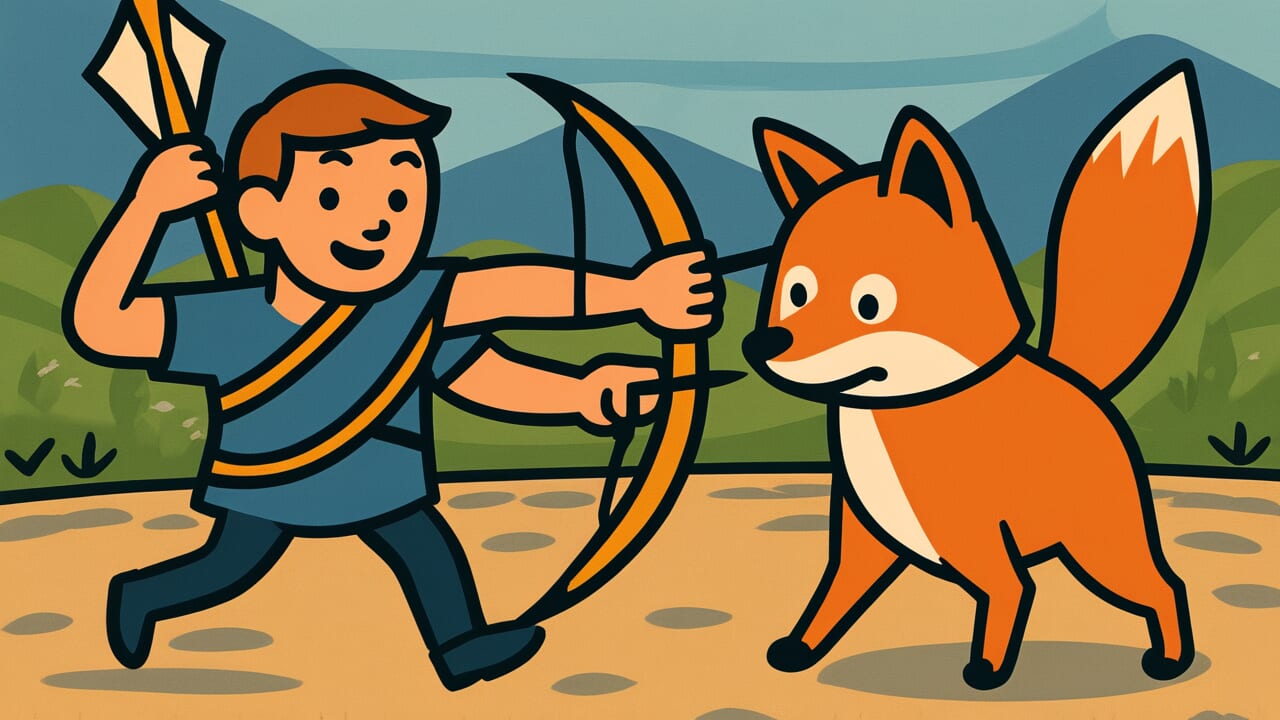How to Read “A fox fears an arrow shot by a poor archer”
Kitsune ga heta no iru ya wo osoru
Meaning of “A fox fears an arrow shot by a poor archer”
This proverb teaches that even unskilled people can succeed by chance, so you should never let your guard down.
No matter how skilled you are, you shouldn’t underestimate someone just because they’re inexperienced.
The actions of unskilled people are unpredictable and can lead to unexpected results. Dangers that an expert could easily avoid might actually cause harm because of a beginner’s unpredictable movements.
This expression is used when someone underestimates their competition or becomes overconfident in their advantage.
It serves as a warning in situations where complacency easily develops, like facing a weaker opponent in sports or dismissing inexperienced competitors in business.
Even today, letting your guard down because of a skill gap can lead to unexpected defeat.
In fact, precisely because opponents are inexperienced, they might take unconventional actions that lead to surprising outcomes.
This proverb teaches the importance of approaching every opponent with sincerity and respect.
Origin and Etymology
No clear written records of this proverb’s origin seem to exist, but its structure reveals an interesting background.
Foxes have long been recognized by Japanese people as representatives of clever and cautious animals.
They appear near human settlements and quickly disappear, confounding hunters. What this fox fears is not the arrow of a skilled archer, but “an arrow shot by a poor archer.”
Why fear the arrow of a poor archer? Because a skilled person’s arrow is predictable.
Through experience, foxes can read when and in what direction a good archer will release an arrow.
However, a poor archer’s arrow is unpredictable. Because the aim is unsteady and the arrow flies in unexpected directions, there’s an incalculable danger.
This idea likely originated from actual hunting experiences.
Hunters pursuing animals knew that arrows shot by beginners caused more unexpected accidents than those of experts.
This observation was passed down as a proverb, serving as a lesson against complacency and arrogance.
Usage Examples
- We let our guard down because they were a lower-ranked team and lost—truly “a fox fears an arrow shot by a poor archer”
- We dismissed it because it was a newcomer’s proposal, but it became a huge hit product—this is exactly “a fox fears an arrow shot by a poor archer”
Universal Wisdom
The truth this proverb speaks is a warning against “arrogance,” a fundamental human weakness.
Why do we let our guard down when we think someone is inexperienced?
It’s because humans instinctively feel reassured by “predictable things.” The actions of skilled people follow patterns and are easy to read.
So we unconsciously relax our vigilance. However, the actions of inexperienced people have no regularity. That unpredictability itself becomes the greatest threat.
This paradoxical truth applies to every aspect of life.
The more experienced people are, the more they rely on their knowledge and experience, making them unable to respond to unexpected situations.
Meanwhile, beginners who know nothing can produce surprising results with ideas unconstrained by common sense.
Our ancestors keenly understood this blind spot in human psychology.
Most reasons why the strong lose to the weak aren’t about the difference in ability, but about the strong person’s complacency.
No matter how excellent someone is, they get tripped up the moment they become arrogant.
This universal lesson was expressed through the familiar metaphor of a fox and an arrow.
A true master is someone who never loses humility toward any opponent.
When AI Hears This
A skilled archer’s arrow is predictable to a fox.
The aiming motion, breathing timing, and moment of release are all patterned, so the fox can “read the next action” and escape.
But a poor archer is different. Because they can’t even hit where they aim, where the arrow flies is completely random.
This is exactly the “signal and noise problem” in information theory.
A good archer emits a clear signal—predictable information. Meanwhile, a poor archer is full of noise, and no matter how much you observe, you can’t read the next arrow’s trajectory.
In game theory, situations where you don’t know your opponent’s strategy are the most difficult to handle.
With a rational opponent, you can predict the optimal solution, but with an irrational opponent, you can’t even create a probability distribution.
The same structure appears in modern society.
Beginner human drivers are scarier than self-driving car accidents because AI has patterns even when it makes mistakes, while beginners are unpredictable.
Corporate security statistics show that while you can defend against skilled hacker cyberattacks, accidentally sent email attachments from people without knowledge are actually more dangerous.
In other words, this proverb contains the deep insight that the essence of danger isn’t “malice or high ability” but “unpredictability.”
Lessons for Today
What this proverb teaches modern people is the importance of humility and preparation.
In today’s society, with advancing globalization and developing AI and technology, situations where experience and track record alone aren’t enough are increasing.
Startup companies threaten large corporations, and young people’s innovative ideas overturn industry conventions.
In such an era, the assumption that “they’re inexperienced so it’ll be fine” is dangerous.
The more veteran you are, the more you should listen to the opinions of newcomers and young people.
Hidden within their “unconventional” ideas might be hints that open up the next era.
Conversely, if you’re in an inexperienced position, you can also leverage your “unpredictability” as a strength.
What’s important is never letting your guard down in any situation and approaching things sincerely.
The humility to learn from opponents you thought were inferior, the caution to prepare for unexpected situations.
These are essential skills for surviving the rapidly changing modern world.
This proverb gives us life wisdom that remains unchanged whether a thousand years ago or today.



Comments